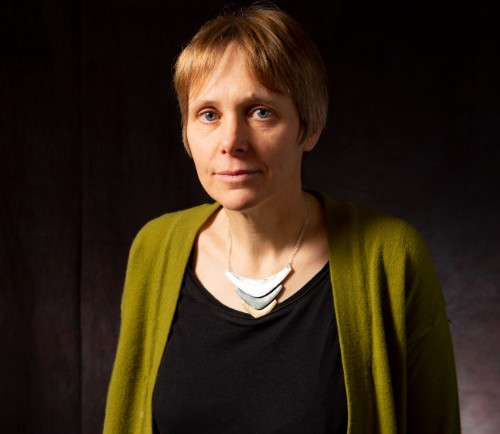New intake includes outstanding academic and artistic minds
Professor Emma Hart, from Edinburgh Napier’s School of Computing, was today announced as a Fellow of the Royal Society of Edinburgh (RSE).
The RSE, Scotland’s National Academy, revealed its 2022 intake of Fellows, with 80 names from the arts, business, public service and civil society as well as academia from Scotland and beyond.
They join the RSE’s current Fellowship of around 1,700 Fellows, who are recognised as being some of the greatest thinkers, researchers and practitioners working in or with Scotland today.

Emma, whose work in evolutionary robotics has attracted significant media attention, said: “I am delighted and honoured to have been elected as a Fellow of the Royal Society of Edinburgh.
“The RSE Fellowship plays a pivotal role in Scotland in tackling the important issues of our society, and in inspiring new ways of thinking through its broad membership drawn from science, arts and business.
“I’m particularly looking forward to working with the RSE to promote the public engagement of science in Scotland, and in raising awareness of the role that AI and technology might play in securing Scotland’s future in a way that is trustworthy, ethical and inclusive.”
Emma gained a First Class honours degree in Chemistry from the University of Oxford, followed by an MSc in Artificial Intelligence from the University of Edinburgh. Her PhD, also from the University of Edinburgh, explored the use of immunology as an inspiration for computing, examining a range of techniques applied to optimisation and data classification problems.
She moved to Edinburgh Napier in 2000 as a lecturer, was promoted to a Chair in 2008, and has gone on to develop significant expertise in evolutionary robotics.
She recently delivered a presentation to the TEDWomen conference in Palm Springs in California, describing why it is challenging to design a robot to explore in an environment you have little or no knowledge about – for example. clearing up waste inside a nuclear reactor or exploring a distant planet – and how you could instead build a technology that uses an artificial form of evolution that enables robots to be designed by a machine, within the environment they need to operate in, where the robots evolve and adapt over multiple generations to optimise their form and behaviour to their environment and task.
Emma has also written for The Guardian, New Scientist and The Conversation.
This year’s intake of Fellows also includes Dr Annie Lennox, Chancellor of Glasgow Caledonian University and award-winning Scottish singer, songwriter and activist, who received an Honorary Fellowship.
Dr Lennox is best known for her musical career as part of the band ‘Eurythmics’ and has also had a distinguished award-winning solo career. She is the original founder of The Circle: a non-profit organisation of women working together to achieve equality for women and girls in a fairer world and was formerly Special Envoy for the Scottish Parliament.
Others named as Fellows of the RSE this year include Professor Mark Logan, co-Founder of Ipso-Facto where he is an investment and start-up adviser. He is also a professor of computing science at the University of Glasgow, and the former COO of Skyscanner, one of Europe's most successful technology companies.
Theresa Shearer, Chief Executive Officer of ENABLE Group and an influential Scottish third sector leader who has delivered policy change both domestically and internationally has also joined the 2022 Fellows intake.
This year’s cohort represents the diversity of expertise within Scotland and the UK, with academics, leaders from business, Scotland’s tech sector, the legal sector and arts and culture industries being inducted to the Fellowship.
With a more diverse Fellowship, the RSE hopes to make even more of an impact across its policy, research and engagement work which seeks to address the key contemporary issues of the day.
Professor Sir John Ball, President of the Royal Society of Edinburgh, said: “It is a privilege to be able to welcome our new Fellows, and we are inspired by the breadth of talent and experience in our Fellowship. Every single individual elected this year has shown exceptional levels of expertise and insight in their chosen field, and their input helps RSE effect real and lasting change in Scotland’s society.
“We look forward to working with our diverse Fellowship who provide a crucial link between the world of academic research and practice with government, business and civil society”.